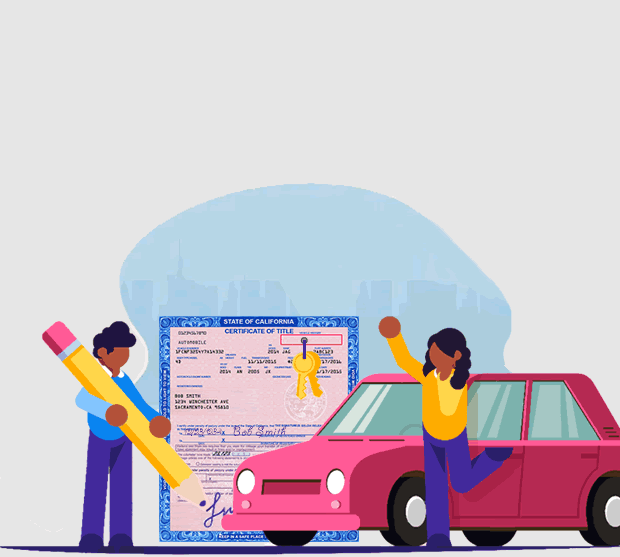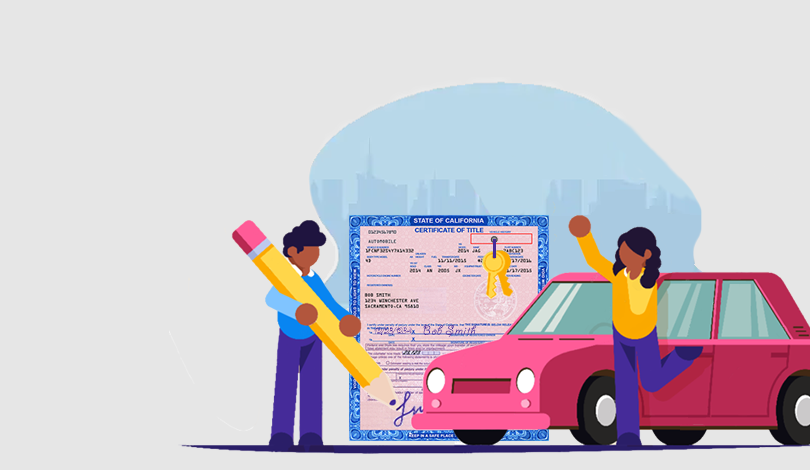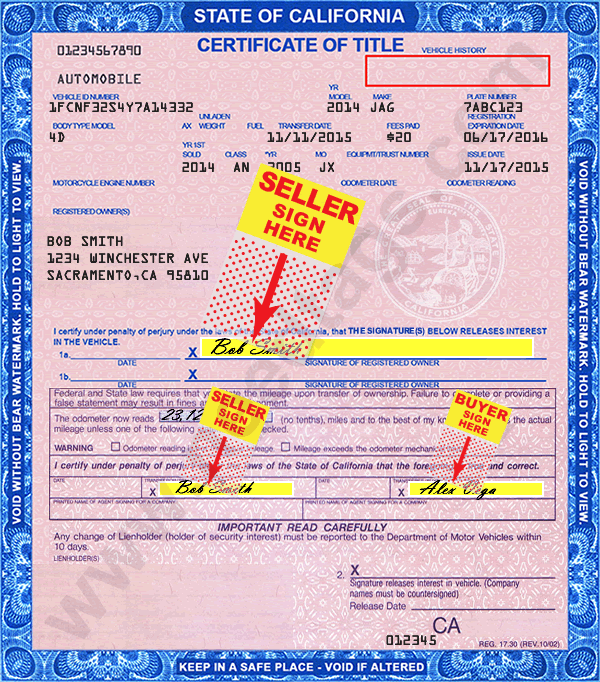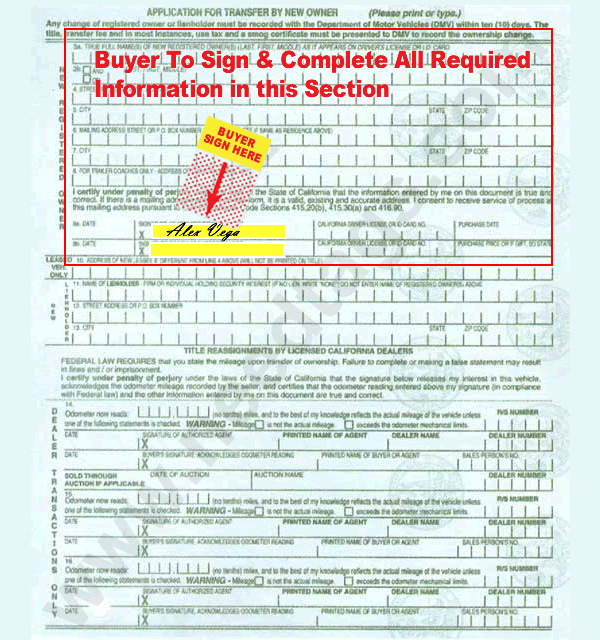California California DMV Title Transfer Online
Fast, Simple, and Secure Vehicle Title Transfer | Officially Licensed by the CA DMV 


Transfer your vehicle title faster and easier online.
California Department of Motor Vehicles services delegated to NeedTags
Instant Registration Card Download a digital copy of your new CA DMV registration card instantly. You can print out your e-Card or display it on your mobile device anytime.
Expedited DMV ProcessingGet DMV tags as fast as next day with API driven technology. Our proprietary platform is built to expedite the processing of your vehicle's title transfer.
Anytime Fee PaymentNeed a smog check or haven't bought insurance? Not a problem. We can post DMV fees and provide immediate proof of ownership.
Shipping AnywhereIt's ok if you recently moved. NeedTags can ship your new California vehicle registration card and sticker to any address in all 50 States.
Personal AssistanceMissing documents? Paperwork incomplete? We can fix it! A dedicated agent will ensure your title transfer experience is stress-free.
California DMV Title Transfer Q & A
I bought a used car. How do I transfer the title to my name?
The process is called a Title Transfer and it's simple to do. You can transfer a vehicle title online through NeedTags in three easy steps. Before you begin, make sure you have a few important documents:
Certificate of Title - In order to perform a DMV title transfer you'll need the vehicle's Certificate of Title, indicating the seller is the owner. Their name must be on the document. The certificate of title is in essence proof of ownership and is needed to register the vehicle in your name. You must ensure there is no second name on the title. If there are two names which are separated by an "AND" or "/" you will need to obtain signatures from both owners before the DMV will accept the title transfer. Two names separated by an "OR" allows either owner (seller) to make the sale and either owner may sign the title.
A certificate of title is often referred to as a pink slip. Both terms during a title transfer mean the same thing, and we refer to them both as simply, a vehicle title. Assuming the seller gave you a title when you bought the car, ensure they signed on line one (1). Line one (1) indicates "Release of Ownership". The seller must sign line one (1) or line one (1) and line two (2), in the case of two owners. The DMV will not transfer the vehicle title without these signature(s).
If the vehicle is model year 2010 or newer, both the seller and buyer must complete and sign the odometer disclosure section of the title. If the title is missing an odometer section, you must complete a Vehicle/Vessel Transfer Form (REG 262) and submit it with your title in order to process a DMV title transfer.

 Bill of Sale - Next, you should have a Bill of Sale (REG 135). A bill-of-sale is not required by the DMV for a title transfer but is highly recommended for the purpose of "proof of purchase" and record keeping. Complete a detailed bill of sale and have the seller sign it, for your protection. A Bill-of-Sale can be written by you or the seller but must be signed by both. You may draft a bill of sale yourself or download one prepared by the State of California DMV from our download forms page.
Bill of Sale - Next, you should have a Bill of Sale (REG 135). A bill-of-sale is not required by the DMV for a title transfer but is highly recommended for the purpose of "proof of purchase" and record keeping. Complete a detailed bill of sale and have the seller sign it, for your protection. A Bill-of-Sale can be written by you or the seller but must be signed by both. You may draft a bill of sale yourself or download one prepared by the State of California DMV from our download forms page.
Smog Certificate - And finally, you might need a smog certificate. Gasoline powered vehicles 4 years and newer do not require one, and full electric vehicles are exempt as well. A smog check is also not required when a title transfer occurs between immediate family members. If your title transfer does not fall into one of these smog exemption categories you will need to provide the DMV a valid smog certificate before your title transfer process can be completed. A smog certificate is valid for 90 days from the date of inspection.
Vehicles which are not required to undergo a smog inspection will be assessed a smog transfer fee. To determine the first year your vehicle will need a change-of-ownership smog check, add four to the model year of the vehicle. Note: Diesel powered vehicle's are exempt from the four or less model years old rule. All diesel vehicles need a valid smog during a DMV title transfer.
When Do You Need a Smog Check in California?
I have my title transfer documents. What's next? Once you have your title transfer documents in order and are ready to pay DMV title transfer fees you may begin the title transfer process. Start the process online through NeedTags or by visiting a local DMV service provider or DMV branch office. Unless your title transfer has special circumstance(s), the three documents above will suffice in getting the vehicle title transferred to your name. We discuss family and out of state title transfers later. The process is similar except an additional document (REG 256) or two is required. To do perform a title transfer at the DMV in-person, please make a DMV appointment prior to your visit.
Certificate of Title - In order to perform a DMV title transfer you'll need the vehicle's Certificate of Title, indicating the seller is the owner. Their name must be on the document. The certificate of title is in essence proof of ownership and is needed to register the vehicle in your name. You must ensure there is no second name on the title. If there are two names which are separated by an "AND" or "/" you will need to obtain signatures from both owners before the DMV will accept the title transfer. Two names separated by an "OR" allows either owner (seller) to make the sale and either owner may sign the title.
A certificate of title is often referred to as a pink slip. Both terms during a title transfer mean the same thing, and we refer to them both as simply, a vehicle title. Assuming the seller gave you a title when you bought the car, ensure they signed on line one (1). Line one (1) indicates "Release of Ownership". The seller must sign line one (1) or line one (1) and line two (2), in the case of two owners. The DMV will not transfer the vehicle title without these signature(s).
If the vehicle is model year 2010 or newer, both the seller and buyer must complete and sign the odometer disclosure section of the title. If the title is missing an odometer section, you must complete a Vehicle/Vessel Transfer Form (REG 262) and submit it with your title in order to process a DMV title transfer.
(Front Image)

(Back Image)

Smog Certificate - And finally, you might need a smog certificate. Gasoline powered vehicles 4 years and newer do not require one, and full electric vehicles are exempt as well. A smog check is also not required when a title transfer occurs between immediate family members. If your title transfer does not fall into one of these smog exemption categories you will need to provide the DMV a valid smog certificate before your title transfer process can be completed. A smog certificate is valid for 90 days from the date of inspection.
Vehicles which are not required to undergo a smog inspection will be assessed a smog transfer fee. To determine the first year your vehicle will need a change-of-ownership smog check, add four to the model year of the vehicle. Note: Diesel powered vehicle's are exempt from the four or less model years old rule. All diesel vehicles need a valid smog during a DMV title transfer.
When Do You Need a Smog Check in California?
I have my title transfer documents. What's next? Once you have your title transfer documents in order and are ready to pay DMV title transfer fees you may begin the title transfer process. Start the process online through NeedTags or by visiting a local DMV service provider or DMV branch office. Unless your title transfer has special circumstance(s), the three documents above will suffice in getting the vehicle title transferred to your name. We discuss family and out of state title transfers later. The process is similar except an additional document (REG 256) or two is required. To do perform a title transfer at the DMV in-person, please make a DMV appointment prior to your visit.
What is important to include in a title transfer Bill of Sale?
We recommend you include the following information in your bill of sale:
Give a copy of the bill of sale to the seller and keep the original for yourself. If you don't have access to a copy machine complete two bill of sales and have the seller sign them both. Should the need arise this information in writing will be invaluable.
- Date of purchase.
- Seller name and address.
- Buyer name and address.
- Vehicle description, including make, model, year, vehicle identification number (VIN), and license plate number. You may also want to notate the vehicle's color and any distinguishing marks and/or features.
- Sale condition, i.e. sold "as-is", sold with warranty and indicating the time-period, sold with damage to engine or drivetrain, and so on.
- If the seller purchased the vehicle but never registered it in their name, the bill of sale should include the previous owner(s) information.
- The amount paid for the vehicle, including any payments made in installments or down payment.
- How payment(s) were made, i.e. cash, check, credit card or direct deposit.
- Most importantly, ensure the bill-of-sale is signed by both you and the seller.
Give a copy of the bill of sale to the seller and keep the original for yourself. If you don't have access to a copy machine complete two bill of sales and have the seller sign them both. Should the need arise this information in writing will be invaluable.
How do I transfer my vehicle title to a family member?
Title transfer between family members require the same process as title transfer between private parties except a smog inspection is not always required, and if the vehicle is being given as a gift, no use tax is due either. You will need to complete and sign a Statement of Facts Form (REG 256) in order to claim your use tax and smog exemption, if applicable. You may not be eligible for a title transfer smog exemption if the vehicle which is being transferred is due for biennial smog check. The California DMV describes family members as: spouse, domestic partner, sibling, child, parent, grandparent, or grandchild.
How much are California DMV title transfer fees?
After acquiring a new vehicle you will be responsible to pay the California DMV all applicable registration fees and use tax. The total amount due will be based on the vehicle's purchase price, sale date, parking/toll violations, registration address city/county, and any special plate requests. For commercial vehicles, unladen or declared gross vehicle weight is used to calculate a separate fee as well. You can look up all your fees by line-item using the NeedTags® online title transfer system.
Registration fees may be due if the vehicle you purchase or acquired has expired registration or registration which is about to expire (75 days or less). If renewal fees are due for the vehicle, the DMV will require you to pay registration fees on top of the use tax and transfer fee. The registration fee will include various county fees, vehicle licensing fee (VLF) equal to 0.65% of the vehicle's value, and a California Highway Patrol (CHP) fee. Here is an itemized list of California vehicle registration fees:
Fees collected are distributed as follows: 40.7% to local government (cities/counties), 25.7% to the CHP, 13.9% to the DMV, 13.0% to Caltrans, 1.7% to the California Air Resources Board, 4.3% to other state agencies, and 0.7% to the general fund.
Note: A vehicle's registration expiration month and day never changes. It is set when the vehicle is originally registered in California. The expiration year will change, but not the actual month and day. The general misconception is that a vehicle's registration expiration month and day changes when the vehicle is sold; the expiration date resets. This is not true. The current expiration date carries over to the new owner. As such, it is beneficial for one to purchase a vehicle with current tags. Doing so will eliminate the requirement of paying registration renewal fees, until of course, the vehicle's registration expiration date.
- Use Tax – Between 7.5% - 10%. Tax collected by the county in which you indent to register your vehicle.
- Transfer Fee – $15.00 or $20.00. DMV fee charge to perform a title transfer. $20.00 for out-of-state vehicles.
- Registration Fee – Does not apply in all cases. Read about registration fees in the paragraph below.
Registration fees may be due if the vehicle you purchase or acquired has expired registration or registration which is about to expire (75 days or less). If renewal fees are due for the vehicle, the DMV will require you to pay registration fees on top of the use tax and transfer fee. The registration fee will include various county fees, vehicle licensing fee (VLF) equal to 0.65% of the vehicle's value, and a California Highway Patrol (CHP) fee. Here is an itemized list of California vehicle registration fees:
- DMV Registration Fee - $46.00 for initial registration/renewal.
- Vehicle License Fee (VLF) - Based on .65% of the value of your vehicle.
- Weight Fee - Applies to commercial vehicles. Determined by weight.
- County/District Fees - Between $7.00 and $47.00 depending on the county in which your vehicle is registered.
- Smog Abatement Fee - $20.00. Applies to vehicles which do not require a smog inspection.
- Owner Responsibility Fee - $7.00 fee for failing to appear on a citation, if applicable.
- CHP Fee - $24.00 authorized under CVC 9250.8, 9250.13, and 9552–9554).
Fees collected are distributed as follows: 40.7% to local government (cities/counties), 25.7% to the CHP, 13.9% to the DMV, 13.0% to Caltrans, 1.7% to the California Air Resources Board, 4.3% to other state agencies, and 0.7% to the general fund.
Note: A vehicle's registration expiration month and day never changes. It is set when the vehicle is originally registered in California. The expiration year will change, but not the actual month and day. The general misconception is that a vehicle's registration expiration month and day changes when the vehicle is sold; the expiration date resets. This is not true. The current expiration date carries over to the new owner. As such, it is beneficial for one to purchase a vehicle with current tags. Doing so will eliminate the requirement of paying registration renewal fees, until of course, the vehicle's registration expiration date.
Who handles the DMV title transfer if I buy a car from a used car dealership?
Used car dealers in California collect DMV fees and process the title transfer for vehicles they sell usually in-house or through a private title transfer service provider. Your purchase contract should include a list of itemized DMV fees. There should be no DMV interaction required by you unless you intend to request personalized license plates or choose to handle the DMV title transfer yourself. Your new certificate of title should be arriving between 6 to 8 weeks. Contact the DMV or the dealership where you purchased the vehicle if you don't receive your vehicle's new title within this time frame.
The seller says they lost the pink slip. Should I still buy the car without it?
Use caution when purchasing a vehicle without title. Unless you are absolutely certain that the seller is the vehicle's owner we'd recommend advising them to apply for a duplicate title, and complete the purchase only after they can provide it to you. The DMV can and will transfer a vehicle's ownership without a title, but it's always recommended to have one. If you've already made the purchase without a title, you can perform a DMV title transfer by using a Duplicate Title Request Form (REG 227) in lieu of the original. The Duplicate Title Request Form (REG 227) must be signed by both you and the seller in order to be valid and accepted by the DMV. You may need to contact the seller to get the form signed. If you have not made the purchase yet, have this form ready with you before you pay for the car or ask the seller to have one prepared. You may download a REG 227 here. If a lienholder release is required, REG 227 will also need to be notarized.
Do I need a smog check before I can complete a title transfer?
This depends on your vehicle's model year. The smog check requirement only applies to vehicles which are 4 years or older and all diesel powered vehicles 1998 & newer, which fall under the smog check program. A smog check is not required if the title transfer is occurring between immediate family members, described as: spouse, domestic partner, sibling, child, parent, grandparent, or grandchild. Title transfers which are exempt from smog inspection will be charged a smog transfer fee instead. It is the responsibility of the seller to provide you a valid smog certificate. Do not buy a vehicle without a passing smog inspection. You can run into financial trouble if the vehicle fails the smog test and requires repairs. Your only option may be to recover costs through small claims court if the seller avoids contact.
How much time do I have to change ownership? Is there a penalty if I'm late?
For the buyer -
If you recently purchased or were given a vehicle either from a family member or private party, per California Vehicle Code section 5902, you have 10 days from the date of sale/acquisition to report the change of ownership to the DMV. Violation of this vehicle code section is an infraction. You must also pay transfer fees within 30 days of the sale/acquisition date to avoid transfer and use tax penalties. It is not necessary to have all your title transfer documents filed with the DMV in 30 days, but it is necessary to pay your title transfer fee and use tax, if applicable.
For the seller - Your requirement is to complete and submit either in person, online, or by mail a Notice of Transfer and Release of Liability (REG 138) to the DMV within 5 days of the sale/gift/trade date. Your name will be on DMV record until the new owner pays transfer fees and completes the title transfer process however REG 138 will relieve you of responsibility for civil or criminal actions involving the vehicle after you've sold, gifted, or traded it.
For the seller - Your requirement is to complete and submit either in person, online, or by mail a Notice of Transfer and Release of Liability (REG 138) to the DMV within 5 days of the sale/gift/trade date. Your name will be on DMV record until the new owner pays transfer fees and completes the title transfer process however REG 138 will relieve you of responsibility for civil or criminal actions involving the vehicle after you've sold, gifted, or traded it.
Should I buy a car from an unlicensed dealer?
Buyers beware of unlicensed dealers who pretend to be private party. The vehicle they advertise will more than likely not be registered to them and their name will not appear on the title. If the vehicle has had multiple sales without DMV notification you may be subjected to paying separate transfer fees for each transfer before the DMV will officially record the change of ownership. An example would be in the case of an unlicensed dealer who has not reported or paid transfer fees for his/her purchase from the previous owner. Under a licensed structure this person's action would be considered sale under consignment. However for the unlicensed dealer, this is a crime. These dealers are illegitimate businessmen who often, due to the lack of facility and licensing, display their vehicles for sale on public streets or at their residence, and several at a time. The penalty after getting caught often includes impoundment of their vehicle(s), stiff fines, and the possibility of not being able to get their car(s) out of impound due to the lack of ownership documentation. Vehicles bought from these sellers will usually have DMV document signatures forged. If you knowingly produce to the DMV forged documents you may be an accessory to the crime. Do not deal with unlicensed dealers.


